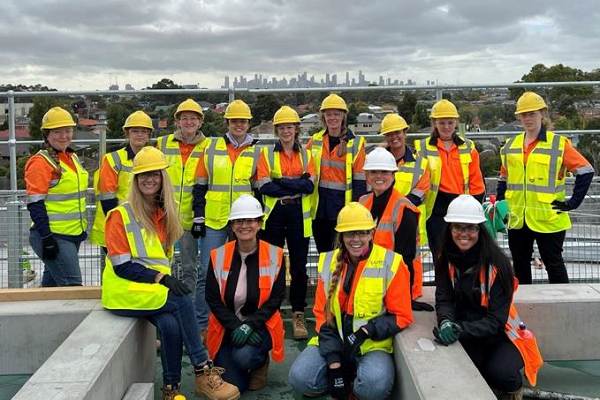“You can’t be what you can’t see”: Shining a light on career pathways for women in trades

Construction firm Kapitol Group has partnered with Empowered Women In Trade (EWIT), a not-for-profit empowering women with the knowledge and skills to join the Australian construction industry, in a bid to sustainably increase female participation over the next five years.
In partnering with EWIT, Kapitol seeks to counteract the dwindling numbers of women joining the male-dominated construction sector and bolster a new wave of females entering the industry.
Research by National Centre for Vocational Education Research (NCVER) shows a decline in the number of women completing a trade which is down 6.3% from 2020. This creates a major issue for the sector in the face of the government’s new quotas requiring at least 45% participation of women across projects by 2024.
To address this decrease, and to stimulate a pipeline of future talent to the sector, Kapitol and EWIT will engage with multiple Victorian schools to educate females on the opportunities both as trades and within the construction industry. Further to educating female students, EWIT and Kapitol will take female workshop participants aged often between 18 and 50, to Kapitol’s building sites and introduce them to the various roles that comprise a construction organisation, as well as host skills workshops and networking events.
Kapitol founder and joint managing director, David Caputo is thrilled to work alongside EWIT to educate and support women about the opportunities within the construction industry: “Kapitol is very excited about this partnership with EWIT. We see a strong alignment in our values of moving the industry forward and challenging the status quo to establish a better future for the industry.
“Construction and trades can be great jobs to work in, particularly in terms of flexibility and remuneration, but unfortunately that has not been the experience for many women, who remain in the minority. We need to address this disparity and increase female representation, not just to address headcount in this era of labour shortages, but to reap the benefits of having diverse perspectives on site and in the office.
“Partnering with EWIT is a step in the right direction whereby we can make an impact in fully supporting women to enter into this industry and most importantly – stay here and make it better.”
EWIT was founded by Hacia Atherton, a CPA-qualified accountant, who fell in love with welding at the age of 29 despite warnings from male relatives working in trades that these industries were a poor fit for women. Hacia’s lived experience set her on a mission to change old stereotypes and instead, empower women in skilled trades.
“Coming from a family with a long history working in the construction industry, I can say first-hand that while the technology and innovation of physical buildings have evolved – attitudes towards women have not,” she says.
“When choosing vocational degrees, many females do not consider working a trade, I know I certainly hadn’t – and so part of our skills workshops is unpacking the unconscious bias that we’ve all inherited that might be holding women back.”
Working a trade can also offer women flexibility whereby they can take extended periods of absence to have children for example, due to minimal upkeep required to maintain the position they held prior. This differs from Ms Atherton who would have to continue earning the yearly requirements to maintain her CPA should she want to take time off to have children.
“While there are many benefits for women for working in construction, having a female presence on-site benefits men too. Recently, I was told of a situation where a woman picked up on an interaction between two men where one was teasing about the IVF struggles he was enduring. The female noticed this man struggling and raised the issue with the other man making these jokes, who had no idea playing down a challenging situation with humour was adding to his mate’s mental burden. As a result of the female bringing this issue to light, no more jokes were made, and the men’s friendship strengthened which positively affected both their well-being.”
